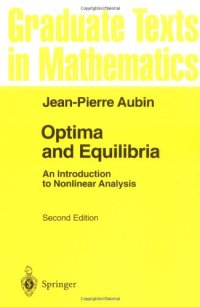
Ebook: Optima and Equilibria: An Introduction to Nonlinear Analysis
Author: Jean-Pierre Aubin (auth.)
- Genre: Mathematics // Optimization. Operations Research
- Tags: Analysis, Economic Theory, Systems Theory Control, Calculus of Variations and Optimal Control, Optimization, Operation Research/Decision Theory
- Series: Graduate Texts in Mathematics 140
- Year: 1998
- Publisher: Springer-Verlag Berlin Heidelberg
- City: Berlin; New York
- Edition: 2
- Language: English
- djvu
Advances in game theory and economic theory have proceeded hand in hand with that of nonlinear analysis and in particular, convex analysis. These theories motivated mathematicians to provide mathematical tools to deal with optima and equilibria. Jean-Pierre Aubin, one of the leading specialists in nonlinear analysis and its applications to economics and game theory, has written a rigorous and concise-yet still elementary and self-contained- text-book to present mathematical tools needed to solve problems motivated by economics, management sciences, operations research, cooperative and noncooperative games, fuzzy games, etc. It begins with convex and nonsmooth analysis,the foundations of optimization theory and mathematical programming. Nonlinear analysis is next presented in the context of zero-sum games and then, in the framework of set-valued analysis. These results are applied to the main classes of economic equilibria. The text continues with game theory: noncooperative (Nash) equilibria, Pareto optima, core and finally, fuzzy games. The book contains numerous exercises and problems: the latter allow the reader to venture into areas of nonlinear analysis that lie beyond the scope of the book and of most graduate courses. -(See cont. News remarks)
Progress in the theory of economic equilibria and in game theory has proceeded hand in hand with that of the mathematical tools used in the field, namely nonlinear analysis and, in particular, convex analysis. Jean-Pierre Aubin, one of the leading specialists in nonlinear analysis and its application to economics, has written a rigorous and concise - yet still elementary and self-contained - textbook providing the mathematical tools needed to study optima and equilibria, as solutions to problems, arising in economics, management sciences, operations research, cooperative and non-cooperative games, fuzzy games etc. It begins with the foundations of optimization theory, and mathematical programming, and in particular convex and nonsmooth analysis. Nonlinear analysis is then presented, first game-theoretically, then in the framework of set valued analysis. These results are then applied to the main classes of economic equilibria. The book contains numerous exercises and problems: the latter allow the reader to venture into areas of nonlinear analysis that lie beyond the scope of the book and of most graduate courses.